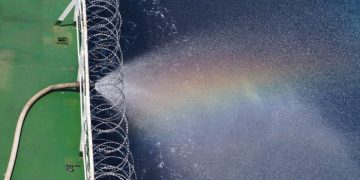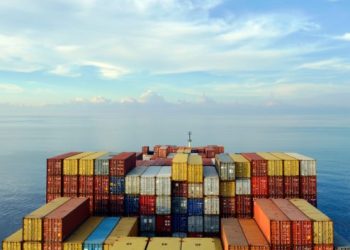As the most efficient carrier of Hydrogen, Methanol is the preferred fuel source for a solution seen as critical to reducing emissions, writes Chris Chatterton, The Methanol Institute
It is abundantly clear that decarbonising the transportation sector and shipping in particular poses a formidable challenge. Energies available to shoreside facilities such as renewable electricity are hard to generate onboard ship despite a handful of projects focussed on this problem.
One of the issues facing owners is that the multi-fuel future is a phased process in terms of regulation, availability and suitability, with LNG and Methanol the only practical short term choices. If the goal, as many believe, is to use Ammonia and Hydrogen as fuel then this has to be seen in the context of safe, affordable and regulated technology.
Hydrogen’s application as a direct fuel could be many decades away. But faced with the problem of needing to cut emissions quickly ahead of 2023 and 2030, shipowners are examining and investing in hydrogen fuel cell technology, with Methanol as the primary energy carrier, where it is either reformed alongside the fuel cell in a separate unit, or integrated within the fuel cell itself.
Fuel cells can already meet the electrical demands of vessels in port and supply power for applications including refrigerated containers and port equipment. And a new generation of fuel cells has the potential to provide both vessel auxiliary and ultimately main propulsion power.
Suitability
Fuel cells generate electricity through an electrochemical reaction rather than combustion; in a fuel cell, hydrogen and oxygen are combined to generate electricity, heat and water. Clean, efficient, reliable and low noise, fuel cells do not need to be periodically recharged like batteries, but instead continue to produce electricity as long as a fuel source is provided.
Unlike combustion-based power generation, fuel cells provide virtually emission-free power and do not produce particulate pollutants or unburned hydrocarbons. They emit less carbon dioxide than other, less efficient technologies and when using fuel generated from renewable sources can be net carbon neutral.
Methanol is an extremely efficient carrier of hydrogen atoms, with the highest hydrogen-to-carbon ratio of any liquid fuel. Liquid Methanol at ambient temperature and pressure packs 40% more H2 by volume than hydrogen in a liquid state (-253C) and 140% more H2 than compressed hydrogen at 700bar. This makes it the ideal source to be re-formed onboard ship and consumed as hydrogen in fuel cells.
[smlsubform prepend=”GET THE SAFETY4SEA IN YOUR INBOX!” showname=false emailtxt=”” emailholder=”Enter your email address” showsubmit=true submittxt=”Submit” jsthanks=false thankyou=”Thank you for subscribing to our mailing list”]
Compact and affordable processes are increasingly available for onboard reforming of Methanol to Hydrogen at qualities necessary to be used in fuel cells and using Methanol as the source reduces cost towards a competitive price with diesel for some generator applications.
Fuel cells are already in use in a number of maritime applications, notably onboard Viking Lines’ ropax ferry M/S Mariella. The vessel is equipped with a fuel cell stack powered by a methanol fuel supply system designed and installed by the Meyer Werft shipyard. Mariella’s Methanol fuel tank is bunkered by truck using a standard hose arrangement and is reformed into Hydrogen and transformed into 90kW of electrical power.
In other small scale applications, e1 has produced a Methanol to Hydrogen generator designed to support 100 kW mobility power applications including replacing polluting diesel generators for refrigerated containers.
New Applications
With the technology proven and accepted, the next stage of development is to further scale fuel cells to provide power for new applications and at higher loads.
Manufacturer SerEnergy has just announced its fourth generation of fuel cell units, SereneU, with claimed advantages including longer lifetime, decreased service and maintenance and lower total cost of ownership. These Methanol fuel cells have the option to interconnect with multiple units resulting in power systems and solutions for larger power demands.
A group of Norwegian companies is developing a solution to lower emissions by combining liquid hydrogen fuel cells with battery storage as soon as 2023 when the IMO’s EEXI and CII regulations enter into force.
Bergen-based system integrator Norwegian Electrical Systems intends to install a 3.2MW hydrogen fuel cell onto a large vessel currently being designed by Havyard Design for the shipowner Havila. This will be the largest fuel cell ever installed on an ocean going vessel, replacing the more frequently used compressed gas. Batteries are planned to store additional energy to make the system fully emissions-free.
Leading tanker shipowner Ardmore has partnered with e1 and Maritime Partners to create e1 Marine with the purpose of delivering e1’s unique methanol-to-hydrogen technology to the marine sector.
e1 Marine will have a worldwide mandate for the marketing, development, licensing, and sale of the hydrogen generation systems for application to the marine industry, including shipping, containers, offshore energy, renewable energy, passenger and leisure and certain port infrastructure and related applications.
RIX Industries has licensed e1’s reforming technology to create a mobile Methanol-to-Hydrogen generation system and provide green power in shipboard and marine environments. With the ability to generate hydrogen onboard and on demand, the RIX system offers users a safer and smaller shipboard volume requirement as compared to high-pressure compressed hydrogen solutions.
Without the heavy and costly footprint of cryogenic liquid hydrogen storage, these highly efficient power systems provide shipbuilders and vessel operators a readily available path away from diesel-based propulsion.
Finally, an innovative fuel cell system based on high-temperature proton exchange membrane (HTPEM) technology designed by fuel cell manufacturer Blue World Technologies is being constructed for testing by Alfa Laval.
The test installation, which will use Methanol as fuel will explore the technology’s potential as a source of marine auxiliary power. Funded by Danish Energy Technology Development and Demonstration Program, the project is a joint effort between Blue World Technologies, Alfa Laval and shipowners including DFDS, Maersk Drilling and Hafnia.
The aim of the project is to establish a highly efficient and cost-effective HTPEM fuel cell, giving marine vessels a realistic alternative to combustion-based auxiliary power within the near future. The fuel cell test setup will have a power of 200 kW, but the fully developed and modular design should be possible to scale up incrementally to a level of 5 MW.
Fuel cells offer shipowners a practical means of adopting hydrogen technology to provide increasingly significant amounts of power. Their advantages of size, reliability and suitability for marine applications make them an increasingly interesting prospect as asset owners consider their decarbonisation options.
Powered by conventional Methanol, fuel cells can already provide significant emissions reductions at prices which are increasingly attractive to owners facing up to the prospect of higher fuel bills in future, by sidestepping the cost prohibitive, cryogenic or compressed gas infrastructure required for pure hydrogen.
As fuel cell projects scale up and larger volumes of renewable Methanol become available, the ability to drive emissions even lower and meet regulatory targets ahead of time becomes a reality.
The views presented hereabove are only those of the author and do not necessarily those of SAFETY4SEA and are for information sharing and discussion purposes only.




























































